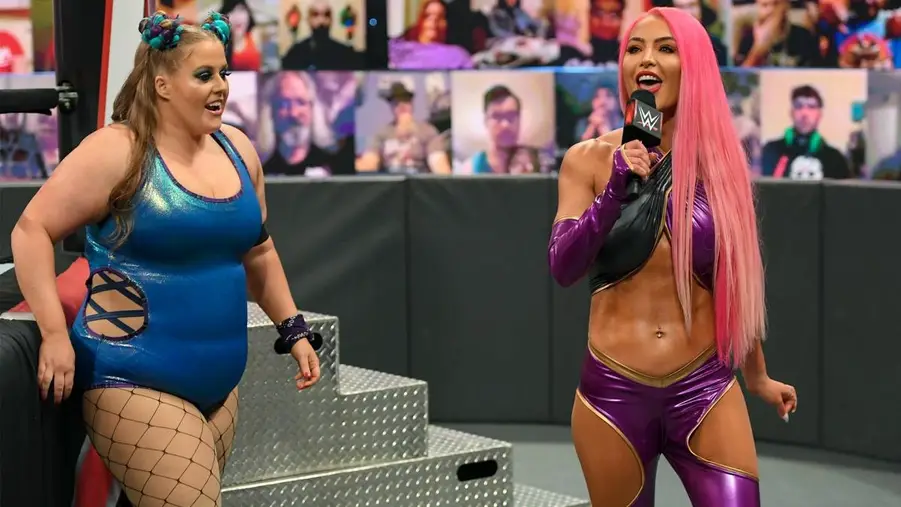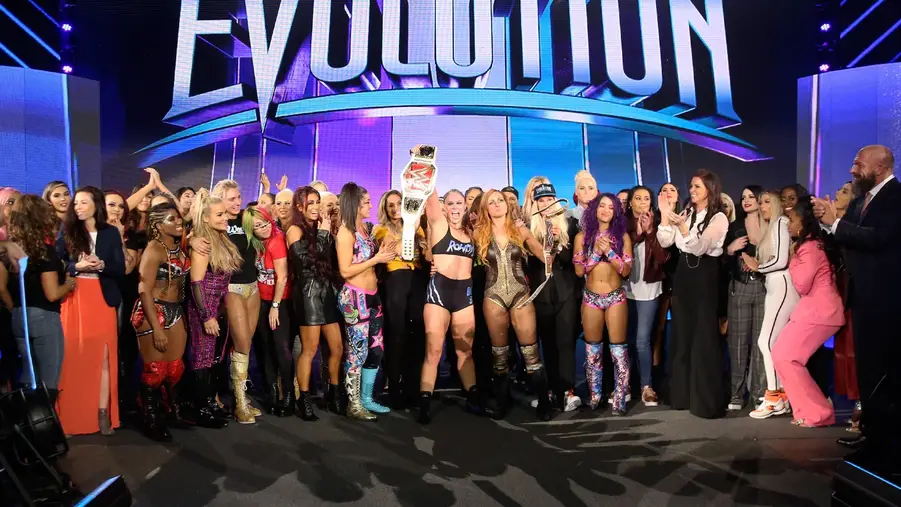Two Years After A First WrestleMania Headline, WWE Has Forgotten How To Book Female Wrestlers Again
Women's wrestling on the WWE main roster has regressed hugely in recent times. Why is more not being done?
In a media call prior to last week’s NXT TakeOver: In Your House, Triple H was asked about the possibility of a second all-women WWE Network special.
It’s fair to say that his answer caused a stir:
‘Haven’t we already done them? [...] Equality is equality. Equality is not “I want my own show.” Equality is not “we have to have our own program.” If I told you that I was making an all men’s program and I didn’t want women on it, it would be criticised.’
In a WWE where male and female wrestlers were booked with any sort of consistency, this would possibly be a valid response. But as we were handily reminded by this week’s Raw, that isn’t the case at all.
It’s true that Monday night saw an extended, well-received match between Rhea Ripley and Asuka, but in terms of WWE’s current treatment of women’s wrestling, this was very much the exception to the rule.
Piper Niven’s appearance made headlines for a variety of reasons: excitement that such a well-travelled talent was finally making her main roster debut, anger at deplorable online body-shaming, and of course, an overriding sense of total confusion. We had the commentary team’s utter refusal to recognise Niven - an NXT UK stalwart and Mae Young Classic quarter finalist - as a pre-existing talent.
Secondly, and more ominously, there was Niven’s demeanour.
On paper, this was a dominant debut. Niven squashed a former SmackDown Women’s Champion in seconds, and despite doing so as an in-ring surrogate for Eva Marie, the victory was clearly all hers. Why then, upon winning the match with such ease, did her ferocity become a giddy, childlike excitement?
Although we don’t have enough proof yet, this points worryingly towards one of WWE’s few women’s wrestling archetypes. You’ve got the naïve girl, the mean girl, the vain girl, the dancing girl - creative voids in which most female main roster members are deliberately kept.
Elsewhere on Raw, we saw the saccharine Nikki Cross pick up another tainted win over Charlotte Flair, the 12-time champion forgetting about the count-out rule to taunt Ripley. We saw the tag champions get into a brawl over a disrupted photoshoot. We saw Alexa Bliss continuing to be spooky. It’s very sad to say, but WWE’s women’s division has regressed in record time. The evolution is over.
In a post-Four Horsewomen world, Vince McMahon seems once again unable to book compelling, layered characters. We’ll still see incredible matches on occasion - Sasha Banks vs. Bianca Belair being the most recent example - but these performances always come in spite of the build, rather than benefiting from it.
Don’t forget, Reginald was inexplicably a central part of that storyline (and we’ve still never been given a reason.)
Returning to Triple H’s words for a moment, it’s worrying to realise that his answer would have been more true had he given it when the Evolution event actually took place. I’m not suggesting that the show was anything other than a positive occurrence, but was it really more vital then than it would be now?
Women’s wrestling was riding an incredible wave in the latter half of 2018, powered by the immense charisma of Becky Lynch, the villainy of Charlotte Flair and the legitimacy of Ronda Rousey. The fact that the trio ended up in the main event of WrestleMania was no coincidence, and certainly did not feel like a token gesture; every step of their ascent was earned. But Evolution was capitalising on a current already in motion.
It may have seemed necessary at the time, but I think the current state of the product has helped redefine what a necessity can truly be.
Evolution is needed far more in 2021 than it ever was in 2018.
Speaking simply from my point of view, it’s disappointing enough to see the WWE women’s division fall away so rapidly, and for its ascent to be cast aside as a fad of the late 2010s. But I cannot begin to imagine how disheartening this must be for the company’s many female fans, for young girls in search of positive role models, and of course, for the wrestlers themselves.
Perhaps Triple H felt so confident in his words because he is not the main culprit. Last weekend’s TakeOver featured two women’s matches on a five-show card, one a serious title bout and the other a divisive horror angle. Yes, silliness is still very much present in the NXT women’s division - just look at the wonderful Indi Hartwell - but it’s never just because they’re women. It’s because they’re wrestlers, and wrestling has all manner of characters.
Widening our scope a little, America’s other major promotions took strides to keep up with the Becky-led boom, only to suddenly find WWE far in the rearview mirror. IMPACT has long been lauded for the depth of talent in its female ranks, even during leaner times for the company. AEW’s Dr. Britt Baker has arguably been the fastest-rising star in world wrestling.
Meanwhile, WWE has a non-existent women’s tag division because Vince can’t bring himself to book two women as friends for a meaningful length of time. The differences are staggering.
WWE’s booking has suffered across the board in the pandemic era, but the regression of the women’s division has been particularly severe and sad. The McMahons were all too happy to pat themselves on the back when times were good, somehow taking credit for a worker-led revolution that railed against their own neglect. Now - aside from Triple H’s tone deaf answer last week - their silence is deafening.


